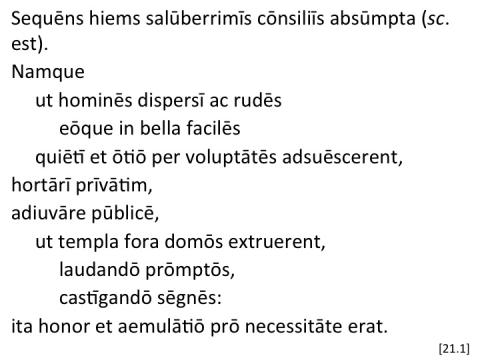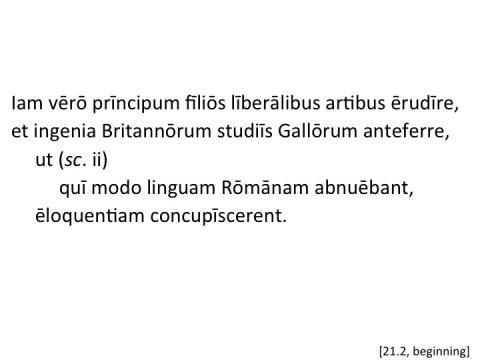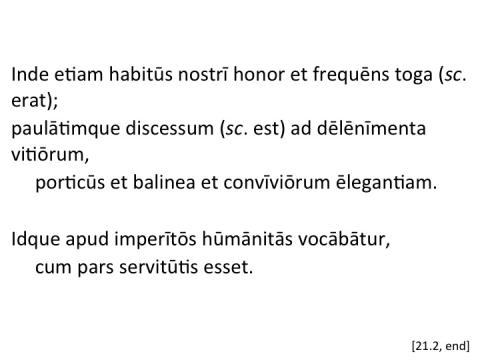Overview: The Britons are initiated into the arts and the refinements of Roman civilization; decadence follows in the path of luxury. (Stuart); this chapter begins on f. 58r of the codex Aesinas.
21.1
cōnsiliīs absūmpta: sc. est. (Damon); it is self-evident that the winter saw only the beginning of the projects. Years would be required for their fruition. (Stuart)
dispersī: so in Germania 16, isolation of residence is quoted as an attribute of barbarism. The Roman was accustomed to connected blocks of dwellings (vici) in fortified towns. (Stuart)
in bella facilēs = ad bella prōnī. Silver Latin affects these poetical variants from the usual phrase. (Pearce); facilēs with in, in place of ad, as also elsewhere in Tacitus, is found but rarely. (Gudeman)
prīvātim: "unofficially," i.e. by personal encouragement of individuals. (Stuart) publice: "officially," i.e. by grants of money from the public treasury. (Stuart) hortārī prīvātim, adiuvāre pūblicē: i.e. Agricola used his private influence with the leading men, and rendered his advice feasible by grants of money to the states. (Pearce)
templa: a rhetorical plural, used for the sake of symmetry with fora, domōs, for the temple to Claudius at Camulodunum seems to have been the only one in existence. See note ch. 5.2. (Gudeman)
tum … mox: adversative asyndeton. The cumulative force of the asyndeton well marks the eager haste of the Britons. (Gudeman)
castīgandō: i.e. in words. (Pearce)
honor et aemulātiō: hendiadys, with a singular verb as at 4.3 mītigāvit ratiō et aetās. Honor et is the original reading of the manuscript (see line 7 in the left-hand column). It is corrected, perhaps by the original scribe or at least early, to honoris, which some editors adopt (see note below). Honor et also appears in 21.2. (Damon) honōris: "the distinction gained by public service." Objective genitive. (Pearce) [A&G 347]
prō necessitāte erat: “took the place of compulsion.” (Stuart)
21.2
ērudīre: “caused to be instructed.” (Stuart)
ingenia: “natural ability,” opposed to studia, “industry.” The meaning is, “he extolled the natural ability of the Britons as superior to that of the Gauls, who improved their natural gifts by culture. Therefore the Britons should cultivate theirs also.” (Pearce)
ēloquentiam concupīscerent: at the end of the first quarter of the second century CE., Juvenal the satirist could say "even Thule speaks of hiring a professor of oratory." If we may judge from inscriptions incised on bricks and tiles (graffiti), by the third or fourth century Latin was used freely in everyday life by artisans and servants in the towns. Romanization could not have been so thorough in the country districts. (Stuart) ēloquentiam: "its literature," a common meaning in post- Augustan writers. The truth of this statement is fairly open to question. At all events, but a few Latin derivatives have survived in English from the time of the Roman occupation, as e.g. mile, port, street, wall, wine, -wick (vicus), -Chester (castra). (Gudeman)
honor: sc. esse coepit. (Pearce) habitūs nostrī honor: "our dress became fashionable," the verb, as usual after inde, being omitted. See Introd. p. xxxi, #6. (Gudeman) et frequens toga: sc. adspiciēbātur, "and as a result the toga was often seen." On this epexegetic et, see note ch. 1.1. (Gudeman) et ... toga: explanatory of habitūs. (Pearce) habitūs nostrī: predicate genitive; "our costume came to be esteemed." [A&G 347-48] The bracae, or pantaloons, were the distinctive national costume of the Brythonic Celts. (Stuart)
discessum: sc. est, impersonal passive. The verb is used metaphorically. (Damon); they departed from their erstwhile purity and simplicity of life. (Stuart)
dēlēnīmenta vitiōrum: “the charms of loose living.” (Stuart); “effeminate and profligate habits.” (Gudeman)
porticus et ... et: the polysyndeton emphasizes each element in the enumeration. See Introd. p. xxvii, #10. (Gudeman)
balinea: extensive remains of Roman baths have been found at Silchester, Wroxeter, and Bath. (Stuart); e.g. at Aquae Sulis, the modern Bath. These enervating luxuries are denounced by Boudicca in Dio Cass. 62.6.4. (Gudeman)
idque: by the ordinary Latin idiom id would have been attracted to agree with the complement hūmānitās. See 46.2. (Pearce)
hūmānitās: "civilization." (Stuart)



